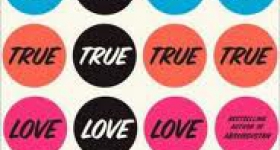Steven Hahn and Francis Hsueh’s feature debut Pretty to Think So is pretty ambitious. In the span of 105 minutes, the film’s main character Hanna, an Indian American investment banker laid off during the dot com bust, takes us through her love triangle with Korean American Jiwon, a lawyer, and Chinese American Alex, a born again youth minister who also happens to be her long-lost childhood friend. Throw in traumatic upbringings, gambling addiction, and New York City right before Bush v. Gore and you’ll get a sense of the somberness that pervades the entirety of the film. The acting can be wooden, and you start to wonder if the characters feel much of anything aside from resigned melancholy. There were interesting story elements that I wished would have been teased out more, such as Hanna's speculation about Jiwon’s dating preferences (she initially suggests he date her Korean friend instead) and the significance of Hanna’s family being the only Indian family in Chinatown during her youth. There are moments when the performances are dynamic and nuanced, but unfortunately they are few and far between. The filmmakers may not have developed the characters enough to fully embody—and not be eclipsed by—the formidable conflicts presented in the film.
For people that want to see more Asian guys getting interracial lovin’ on the big screen, Gina Kim’s Never Forever may help your cause. Vera Farmiga (The Departed) plays Sophie Lee, the dutiful Caucasian wife of a handsome Korean American corporate hotshot. She pays an equally handsome illegal Korean immigrant named Jihah (Jung-woo Ha) to impregnate her rather than break the news to her husband (and in-laws) that he’s sterile. Director Kim gracefully travels between Sophie’s two worlds as the chipper housewife in the affluent suburbs and the steely businesswoman in Jihah's cramped Chinatown apartment. Farmiga gives an amazing performance as a woman so dogged in her efforts to save not only her marriage, but the image of her marriage for the sake of others. Sophie’s connection with Jihah is palpable and Kim plays up the outsider status of both these characters. Jung-woo Ha’s performance possesses a naturalness that counteracts beautifully with Farmiga’s anxious Sophie. It is truly an exquisite film with one of the most poignant (schmaltz-free) endings I’ve seen in quite some time.
In Michael Kang’s West 32nd, an up-and-coming lawyer named John Kim (Harold and Kumar’s John Cho) convinces his firm to take on a pro-bono case defending a Korean American teenager accused of murder, hoping it will raise their (and his) profile. His involvement in the case brings him into the heart of Queens’ Koreatown where he meets Lila (Battlestar Galactica’s Grace Park), the older sister of the accused and Mike Juhn, a wannabe mobster with a loyal stable of goofy thug underlings that may have information about the murder. Mike takes a liking to John and has him accompany him on nights out in Ktown. John, a Korean American not immersed in Korean American culture, gradually becomes more emotionally invested in the case (there’s a bit of a twinkle between him and Lila) and as he curries favor with Mike for access into Ktown, he also becomes invested in his new ne’er-do-well friend and a cultural lifestyle that has been foreign to him. Cho embodies both self-assurance and awkwardness perfectly and his performance is one of many in the film that capture the film’s overarching theme of navigating between realms, whether it be different subsets of Korean American life or different sides of the grey line between right and wrong.
The film, however, belongs to Jun Kim and his portrayal of Mike. Kim is able to make Mike at once charismatic, funny, violently psychotic, and insecure and the audience understands why John and others are drawn to him and of course why they shouldn’t be. The film’s subtle but rich details about this generation of Korean Americans illuminate a larger Asian American experience. Mike and his cronies expertly toggle back and forth between English and Korean. They beatbox and breakdance in the street before bowing to greet elder Koreans. They respect the rules of Ktown’s criminal world but yearn to make a name for themselves, exhibiting perhaps an American brashness that defies the Korean way of the gun. Koreatown allows them to inhabit both cultures and to navigate the two freely, but the film suggests that outside of that enclave, they still face the binary identity of being either Korean or American, a concept wonderfully presented in a scene where Mike nervously joins a suit-and-tied John in a “white” bar outside of Queens.
Unfortunately, West 32nd's March 16 screening is sold-out, but it'd definitely be worth waiting in the rush line for potential open seats.
Check out the SFIAFF website for event schedules, film synopses, and more.
This blog entry is graciously sponsored by Toyota Matrix, check out
their website devoted to the best in Asian American film.
 align="left" hspace="6" alt="Toyota Matrix" />
align="left" hspace="6" alt="Toyota Matrix" />










Comments